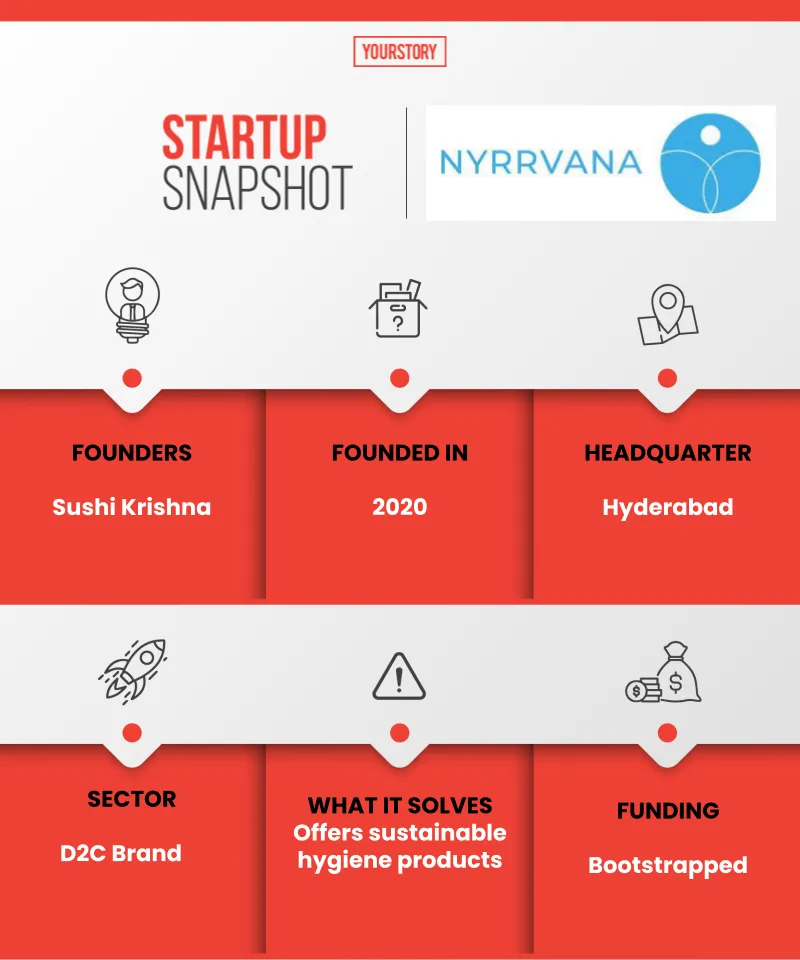This woman entrepreneur wants you to take hygiene and precautions seriously amid COVID-19
The general unwillingness of Indians towards following COVID-19 precautions prompted Sushi Krishna to start Nyrrvana, a Hyderabad-based venture offering sustainable hygiene products.
During the pandemic last year, Sushi Krishna was among a group of Indians stranded in Singapore and returned to India through Vande Bharat Mission in September 2020. Upon her return, she noticed a change in behaviour between the two countries.
“Where people in Singapore followed every government rule and safety norms to a tee, most people in India were not taking the precautions seriously. Many people said they do not use hand sanitisers because it burns their hands and cuticles,” she notes.
Pregnant with her second child at the time, she had been looking for job opportunities and was giving job interviews in Singapore after being on a maternity break for three months. However, Sushi’s experience of returning to a pandemic-stricken India led her to venture into entrepreneurship.
Hand sanitisers had become a household mainstay during the pandemic. So, Sushi decided to focus on a healthy alternative.
“My first thought was when you follow strict oral hygiene just to avoid something as simple as going to a dentist, why not a strict hand hygiene when it can avoid not just coronavirus but other 100-something diseases,” she tells HerStory.
In November 2020, Sushi founded Nyrrvana, a Hyderabad-based business specialising in sustainable sanitisers.

Against all odds
Sushi was eight months pregnant when she began working on Nyrrvana. She says most people did not appreciate the idea as there were many existing vendors in the market.
With the support of her husband and sister, and entrusting in the need for a healthy alternative, Sushi went ahead to work with an all-women run manufacturing facility at Balanagar, Hyderabad, and worked with scientists to formulate a range of hygiene products.
These include AYUSH-certified hand sanitisers, hand wash, and germ protection soaps – all of which have undergone at least four rounds of research and development tests.
Till March this year, Sushi had been a one-woman army running the show – from handling sales calls, explaining the products to customers, sending samples to retail stores and hospitals, dealing with manufacturers, to finally, labelling the products.
Navigating the market
Operating on both B2C and B2B models, Nyrrvana uniquely caters to over 20 clients across India through its B2B association.
Sushi works with cafes and at events like weddings by offering customised colour and fragrances to match the themes, as “they are all about the ambience and particular about how the interiors look.”
Sushi says entering local retail markets has been challenging as many are sceptical of adopting new and smaller brands.
“Most distributors don't differentiate between a product and brand, and are all consumed with going with bigger names and are not ready to embrace smaller brands,” she adds.
Priced between Rs 30 and Rs 288, the products are available on ecommerce sites such as Amazon, Flipkart, and the company’s own website.
“We cannot produce in the volume that commercial products are made. Our price point is Rs 5 higher than those offered by Dettol and Lifebuoy, but they don't have any essential oils,” Sushi explains.
Started with an initial investment of Rs 10 lakh, the startup earns 40 percent profit margin monthly. It has also donated sanitisers to Anganwadi workers in Hyderabad and non-profit initiatives like Bissi Bissi Oota giving free meals to COVID-19 patients.
For the mother of two, donning the entrepreneurial hat has been quite a journey but says many people underestimate and think “people running their own business need not work.”
Edited by Kanishk Singh








